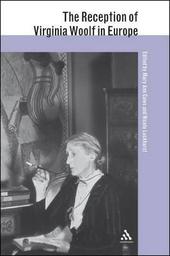
|
The Reception of Virginia Woolf in Europe
Paperback / softback
Main Details
Description
The intellectual scope and cultural impact of British writers cannot be assessed without reference to their European fortunes. These essays, prepared by an international team of scholars, critics and translators, record the ways in which Virginia Woolf has been translated, evaluated and emulated in different national and linguistic areas of Europe. Diverse as her reception has been, as analyst of consciousness, as a decadent (censored and banned), as stylistic innovator of Modernism, as crusading feminist and socialist, and as a model for other writers, she has emerged as one of the foremost writers and principal icons of the century.
Author Biography
Mary Ann Caws is Distinguished Professor of Comparative Literature, English, and French at the Graduate School of the City University of New York. Nicola Luckhurst has written on Proust (Science and Structure in Proust's 'A la recherche du temps perdu' (OUP, 2000)), Montaigne, Gisele Freund, and Virginia Woolf. Her new translation of Freud's Studies in Hysteria was published in 2004.
Reviews"Mary Ann Caws and Nicola Luckhurst have done a great job in editing and selecting the articles incorporated in this volume, which, in general terms, takes on an ample scope of Woolfian studies in Europe. In this context, the book will undoubtedly be useful for anyone interested in the apparently well-known, but still elusive figure of Virginia Woolf...this book is an unquestionable achievement. It is a must for anyone interested in Woolf studies, for it contains a wealth of material and documentation that was impossible to find before and that would have required exhausting work for any scholar to bring together." Antonio Ballesteros, Atlantis Journal, September 2004 -- Antonio Ballesteros, Atlantis Journal, September 2004 "A pioneering work in comparative reception studies, this book is a well-documented survey of the reception, translation, and evaluation of Virginia Woolf's writings in Europe...As a first exploration of the European reception of Woolf in comparative perspective, it contains the seeds for many new areas of investigation." Liedeke Plate, The Comparatist, 2003 -- Liedeke Plate, The Comparatist "This rich volume enlarges our understanding of how a writer can become caught up in movements far beyond her own awareness. It reminds us too of how the rhythms pose, the twists of a sentence, can carry sensibility through from language to language. Woolf has been appropriated repudiated, inhabited, by writers and critics across Europe...this volume [has] a range of essays that give us real insight into how a writer is made anew by different readers." Gillian Beers, Comparative Critical Studies -- Gillian Beers, Comparative Critical Studies "Mary Ann Caws and Nicola Luckhurst bring together a broad selection of essays exploring the impact of Woolf's work in European traditions ranging from German to Catalan to Polish. The work includes extensive bibliographical material that moves beyond the scopes of the articles, useful information on translations on Woolf's work, and a timeline outlining the reception of Woolf's work in Europe. This collection gives a sense of the breadth and depth of the influence of Woolf's work across Europe and provides invaluable access to very recent fictional works coming out of Greece and Spain, for example, many not yet available in translation. We learn as much about the specific domestic concerns of the cultures reading Woolf as we do about Woolf." -Tulsa Studies in Women's Literature, Spring 2004 "This important new scholarship is teaching us to re-read Woolf as a European writer, and in a European context...maps fields of knowledge almost unknown to English-language scholars: decades of scholarly work...Woolf is now a staple of modern literature in the English-speaking world, both for students and for the 'common reader' Woolf herself so valued. Her important in other languages and cultures has only recently been recognised, and these books are valuable introductions to the topic." Trudi Tate, Quadrant -- Trudi Tate * Quadrant *
|